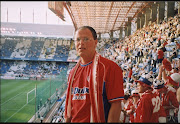 An unreliable sporting history of the Reds
An unreliable sporting history of the RedsCristo (surname unknown)
The early 1960s was the first golden age of Shelbourne football as any oul’ feller in Section D with twelve hours on his hands will tell you. Gerry Doyle’s young charges were Ireland’s Busby babes and many like Strahan, Dunne, Barber and Flood would go on to become household names, particularly in their own households.
In 1961-62 (the League of Ireland only adopted the Gregorian calendar in 2004) the mighty Reds clinched the league championship with a 1-0 victory over Cork Unpredictables and were thus eagerly anticipating their first foray into Europe in September of the latter year.
Drawn against Sporting Lisbon – so called because they always wished the opposition good luck prior to a game, before running off sniggering - a 2-0 home defeat in front of ‘nearly a million people’ (source: the oul’ lad with the red nose who always sits in the middle of the third row ) did not dampen the spirits of the small contingent of Shels fans who set sail from Queenstown on a coffin ship bound for the great maritime port of Lisbon.
Most of course had never been abroad before and there was much wailing and fluttering of handkerchiefs as the ship pulled away from the quay, and that was just the captain. In the early sixties, the only Irish people who ventured abroad were missionaries or emigrants and knowledge of foreign climes was decidedly limited. Many didn’t even know what a clime was.
Arriving in the bustling Portuguese capital, the pioneering band immediately sought out some Guinness to quell their seasickness. Sadly Arthur had not become the worldwide phenomenon it is today and so they were forced to sit down to enjoy several pints of the local brew (port) in a local hostelry before the match.
After the game, the desire to celebrate Jackie Hennessy’s brilliant strike (sandwiched, as it was, between five offside and / or handball goals from their opponents) led them back to the same bar and they obligingly drank it dry.
Now, among the coterie, were a married couple Bert and Cinta, both in their fifties, good devout Catholics. Cinta was horrified to wake up in her hotel the following morning to find a dashing and strapping young Portuguese stud in her bed, rather than her balding and paunchy husband. Bert similarly awoke, straddling a lithe and attractive senorita in a strange apartment.
To cut a short story even shorter, after the initial shock had worn off, both decided to run with the new situation. Bert stayed on in Portugal with Isabella, while Cristiano sailed back to Ireland with Cinta, who successfully convinced the customs officials of the poor quality of Irish passport photographs. It was apparently a little more difficult convincing their ten children that their father had benefited from the European sunshine to such an extent that he had grown six inches, lost six stones and his hair had grown back.
Cristiano – or Cristo has he became fondly known on the terraces – naturally became a big Shels fan, though he had some trouble learning the words of some of the songs. He would also sing “We’re not Barcelona but at least we’re not Belenenses” to the consternation of those around him. At away games, he would be introduced to opposition supporters as ‘a representative of our Portuguese fan club’ and he would frequently bamboozle the play-it-down-the-line brigade by exhorting the fullback to ‘slip it to the defensive midfielder and show for the return.’
Cristo would probably be in Tolka Park still if it were not for the fickle finger of fate – and probably the rest of its body too – that saw the Redsmen drawn against the aforementioned Belenenses in the Cup Winners Cup two years later. Naturally, Cinta and Cristo could not miss such an important tie and sailed from Galway with much the same army of Reds fans as two years previously.
Unfortunately, this time they were met on the quays by an irate Bert. Isabella had turned out to be Rodrigo, a docker from Porto, and despite a close and loving relationship for almost a year, eventually the magic died when Rodrigo met a sheep from Albufeira called Simon.
Bert threatened to pull the plug on Cristo’s passport deception unless Cinta took him back and after several pints of port, she eventually agreed. How they explained the further vagaries of the Portuguese climate to their children on Bert’s return is lost to history.
It is said that a lovelorn figure still stalks the Lisbon quays waiting for his ‘darling Irish chrysanthemum’ to return, but that is another feller altogether and has nothing to do with this story.




No comments:
Post a Comment